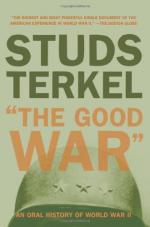
|
| Name: _________________________ | Period: ___________________ |
This test consists of 15 multiple choice questions and 5 short answer questions.
Multiple Choice Questions
1. What was a victory girl?
(a) A girl who danced at the USO and wrote letters to soldiers.
(b) A girl who sang with Bob Hope.
(c) A girl who joined the Women's Army Corps.
(d) A military nurse.
2. What did Dr. Drude teach his high school students in Hamburg about the Nazis?
(a) The Nazis were incorruptible.
(b) The Nazis could be defeated.
(c) The Nazis were morally correct.
(d) The Nazis were unconquerable.
3. What is the difference between an Anderson shelter and a Morrison shelter?
(a) The Morrison shelter was indoors; the Anderson shelter was outdoors.
(b) The Anderson shelter was provisioned with food.
(c) The Anderson shelter held twice as many people as a Morrison shelter.
(d) The Anderson shelter was outdoors; the Morrison shelter was in the living room.
4. How did thieves among army personnel fool the MPs?
(a) The thieves would sell equipment and claim it was stolen.
(b) The thieves would hide equipment and go back for it later.
(c) The thieves would pretend they lost equipment.
(d) The thieves would over-report their battle losses.
5. What kept Herman Kogan from being afraid during the assaults on Sugarloaf Hill?
(a) He was in no danger.
(b) He was unaware of the danger.
(c) He was too tired to be afraid.
(d) He was too intent on getting the story to be afraid.
6. What kept Joseph Small from being injured when the barracks in Port Chicago was demolished?
(a) He was in a door jamb.
(b) He was under a bed.
(c) He had a mattress on top of him.
(d) He was under a desk.
7. Why was Walter Rosenblum welcomed in French farmhouses during the war?
(a) He had access to army rations.
(b) He offered protection from looters.
(c) He brought news from the front.
(d) He was an entertaining storyteller.
8. Why was Joseph Small tried for mutiny?
(a) He refused to return to duty after the explosion at Port Chicago.
(b) He persuaded other men to refuse to work.
(c) He started the explosion at Port Chicago.
(d) He started a riot at Port Chicago.
9. What was the OWI?
(a) Outstanding War Information.
(b) Office of War Information.
(c) Obvious War Information.
(d) Official War Information.
10. What racism did Sheril Cunning experience growing up in California?
(a) Her family was anti-Semitic and anti-black.
(b) Her family was persecuted for their ethnicity.
(c) Her family was anti-Japanese.
(d) Her family were members of the Ku Klux Klan.
11. According to Lee Oremont, what effect did price controls during the war have on the economy?
(a) Price controls prevented a devastating inflation.
(b) Price controls made producers dependent.
(c) Price controls made consumers over-confident.
(d) Price controls nearly destroyed the economy.
12. How many soldiers were killed when the ammunition dump at Port Chicago blew up?
(a) Three hundred and twenty.
(b) Fifty-seven.
(c) Five hundred.
(d) Two hundred.
13. What were newsmen in the OWI not allowed to do?
(a) Broadcast news.
(b) Broadcast commentary.
(c) Broadcast breaking stories.
(d) Broadcast non-official news.
14. What did Walter Rosenblum do during WWII?
(a) He was a brigade commander.
(b) He was a combat photographer.
(c) He was a Voice of America reporter.
(d) He was a flautist in the army band.
15. What advantage does Alfred Duckett believe the war offered blacks?
(a) Income.
(b) Training.
(c) Insurance.
(d) A chance to prove themselves.
Short Answer Questions
1. What was Battle Fatigue called during World War I?
2. According to Tommy Corcoran, how did Germany support their propaganda machine?
3. According to Alfred Duckett, what bothered black soldiers most?
4. What is a thirteen-week wonder?
5. What proportion of the inhabitants of Leningrad died when Hitler's forces laid siege to the city?
|
This section contains 638 words (approx. 3 pages at 300 words per page) |

|




